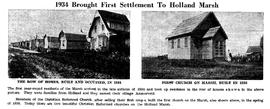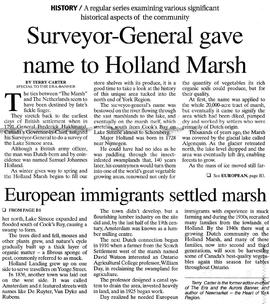"The first year-round residents of the Marsh arrived in the late autumn of 1934 and took up residence in the row of houses shown in the above picture. They were families from Holland and they named their village Ansnorveld.
Members of the Christian Reformed Church, after selling their first crops, built the first church on the Marsh, also shown above, in the spring of 1936. Today there are two beautiful Christian Reformed churches on the Holland Marsh."
Settlement
6 Archival description results for Settlement
Contains items relating to the early history of Bradford, Holland Landing, and West Gwillimbury
Bradford West Gwillimbury Public LibraryContains items relating to the governing of Bradford West Gwillimbury. Headings include:
Census, Surveys, Population and Other Statistics
Council History
Council Minutes
Deeds
Federal and Provinicial
Governor Simcoe
Municipal Governments
Land Settlements and Roads
Newspaper Articles 1 of 2
Newspaper Articles 2 of 2
Re-enactments
Taxes
Town Crest
Voter's List
*Governing - Other
One binder of handwritten transcripts of land registry data for Concessions 1-8, compiled by Marcia Lee in June, 2001. Mostly ballpoint pen on lined paper, with some notes and drawings in pencil and/or highlighted with various colours of highlighter.
Marcia LeeOne binder of handwritten transcripts of land registry data for Concessions 9-15, compiled by Marcia Lee in June, 2001. Mostly ballpoint pen on lined paper, with some notes and drawings in pencil and/or highlighted with various colours of highlighter.
Marcia Lee"The ties between "The Marsh" and the Netherlands seem to have been destined by fate's fickle finger. They stretch back to the earliest days of British settlement when in 1791 General Frederick Haldimand, Canada's Governor-in-Chief, assigned his Surveyor-General to do a survey of the Lake Simcoe area. Although a British army officer, the man was Dutch-born and by coincidence was named Samuel Johannes Holland." ...
Era Banner
